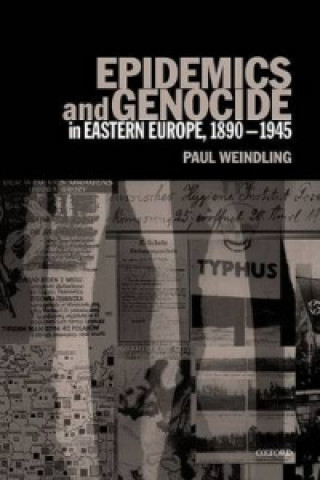
Code: 04523176
Epidemics and Genocide in Eastern Europe, 1890-1945
by Paul Weindling
During the First World War, delousing became routine for soldiers and civilians following the recent discovery that the louse carried typhus germs. But how did typhus come to be viewed as a "Jewish disease" and what was the connec ... more
- Language:
 English
English - Binding: Hardback
- Number of pages: 486
Publisher: Oxford University Press, 2000
- More about this

You might also like
-

Express Series: English for the Automobile Industry
56.83 € -

The Fate of King David
73.51 € -

Europe, or The Infinite Task
39.32 € -

Psychology of Religion
87.41 € -

Future Pasts
160.31 € -

International Dictionary of Food & Nutrition
68.16 € -

Servants of the Law
102.55 €
Give this book as a present today
- Order book and choose Gift Order.
- We will send you book gift voucher at once. You can give it out to anyone.
- Book will be send to donee, nothing more to care about.
More about Epidemics and Genocide in Eastern Europe, 1890-1945
You get 817 loyalty points
 Book synopsis
Book synopsis
During the First World War, delousing became routine for soldiers and civilians following the recent discovery that the louse carried typhus germs. But how did typhus come to be viewed as a "Jewish disease" and what was the connection between the anti-typhus measures during the First World War and the Nazi gas chambers in the Second World War? In this powerful book, Professor Weindling draws upon wide-ranging archival research throughout East and Central Europe to the United States, to provide valuable new insight into the history of German medicine from its response to the perceived threat of typhus epidemics from its Eastern borders. He examines how German experts in tropical medicine took an increasingly racialised approach to bacteriology, regarding supposedly racially inferior peoples as carriers of the disease.So they came to view typhus as a "Jewish" disease. By the Second World War as migrants and deportees had become conditioned to expect the ordeal of delousing at border crossings, ports, railway junctions and on entry to camps, so sanitary policing became entwined with racialisation as the Germans sought to eradicate typhus by eradicating the perceived carriers. Typhus had come to assume a new and terrifying genocidal significance, as the medical authorities sealed the German frontiers against diseased undesirables from the east, and gassing became a favoured means of disease eradication.
 Book details
Book details
Book category Knihy po anglicky Humanities History Regional & national history
332.48 €
- Full title: Epidemics and Genocide in Eastern Europe, 1890-1945
- Author: Paul Weindling
- Language:
 English
English - Binding: Hardback
- Number of pages: 486
- EAN: 9780198206910
- ISBN: 0198206917
- ID: 04523176
- Publisher: Oxford University Press
- Weight: 978 g
- Dimensions: 242 × 164 × 31 mm
- Date of publishing: 03. February 2000
Trending among others
-

Hundred Years' War on Palestine
12.14 € -24 % -

Ten Myths About Israel
12.55 € -16 % -

Diana: Her True Story - In Her Own Words
12.35 € -23 % -

Medieval Monsters
11.21 € -23 % -

Dictatorland
13.79 € -8 % -

Memoirs from the House of the Dead
11.93 € -

Anatomy of the Nuremberg Trials
17.70 € -3 % -

Line in the Sand
11.73 € -7 % -

Conquest of New Spain
14.51 € -23 % -

Pity of War
21 € -23 % -

Washington
19.45 € -20 % -

Slightly Out of Focus
15.13 € -22 % -

Great War for Civilisation
20.17 € -22 % -

Strange Death of Europe
22.54 € -9 % -

Great Siege, Malta 1565
18.01 € -16 % -

Fortress Third Reich
27.89 € -

Imperial Japanese Naval Aviator 1937-45
24.81 € -

Bismarck and the Development of Germany
106.77 € -

Rolling Thunder Against the Rising Sun
35.82 € -1 % -

Families Who Made Rome
16.16 € -20 % -

Arthur and the Anglo-Saxon Wars
18.01 € -4 % -

Machiavelli and Guicciardini
26.97 € -

Complete Pompeii
39.74 € -4 % -

Setting the Desert on Fire
16.36 € -13 % -

Alexander the Great
18.83 € -23 % -

History of Siam
42.21 € -

Hekate Soteira
57.96 € -

Fortress France
24.50 € -

Records of the Medieval Sword
34.59 € -9 % -

P-40 Warhawk Aces of the MTO
29.23 € -

Alexander the Great
68.16 € -

British Destroyers 1939-45
14.51 € -23 % -

Ethnic Cleansing of Palestine
14.51 € -23 % -

Decline and Fall of the Roman Empire
5.96 € -21 % -

Strange Death of Europe
16.57 € -23 % -

The Balkans, 1804-2012
22.13 € -23 % -

Empress of the East
14.51 € -23 % -

Palestine
20.28 € -22 % -

The Secret Diaries Of Miss Anne Lister: Vol. 1
13.58 € -15 % -

Giza Power Plant
16.05 € -17 % -

Rise And Fall Of The Third Reich
22.13 € -23 % -

Citizens
22.13 € -23 % -

Millennium
13.27 € -24 % -

Alexiad
17.91 € -20 % -

Maurice's Strategikon
30.78 € -2 % -

Voynich Manuscript
41.59 € -

Last Voyage of the Lusitania
20.79 € -

1948
24.81 € -10 % -

Annals of Imperial Rome
14.51 € -23 %
Osobný odber Bratislava a 2642 dalších
Copyright ©2008-24 najlacnejsie-knihy.sk Všetky práva vyhradenéSúkromieCookies



 21 miliónov titulov
21 miliónov titulov Vrátenie do mesiaca
Vrátenie do mesiaca 02/210 210 99 (8-15.30h)
02/210 210 99 (8-15.30h)